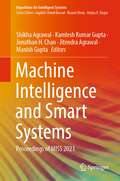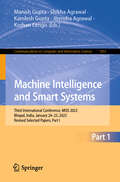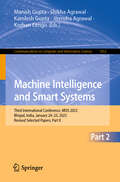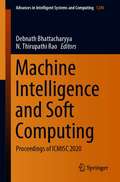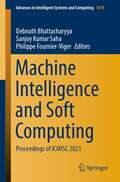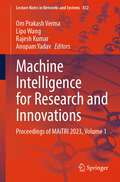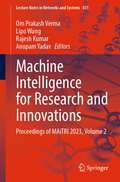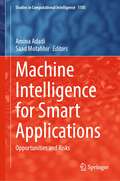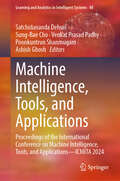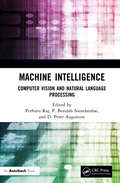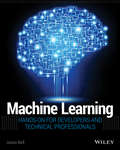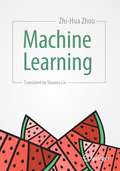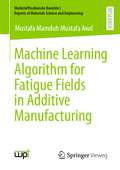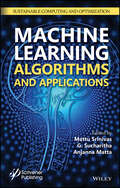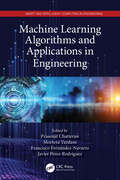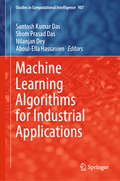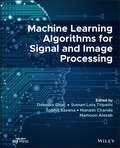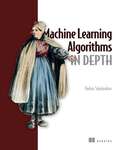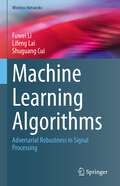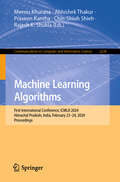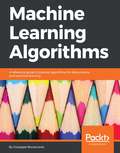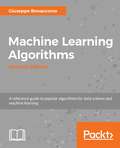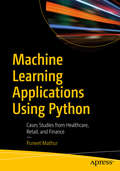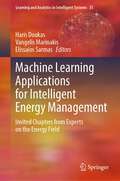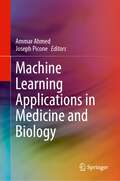- Table View
- List View
Machine Intelligence and Smart Systems: Proceedings of MISS 2021 (Algorithms for Intelligent Systems)
by Jitendra Agrawal Jonathan H. Chan Manish Gupta Shikha Agrawal Kamlesh Kumar GuptaThis book is a collection of peer-reviewed best selected research papers presented at the Second International Conference on Machine Intelligence and Smart Systems (MISS 2021), organized during September 24–25, 2021, in Gwalior, India. The book presents new advances and research results in the fields of machine intelligence, artificial intelligence and smart systems. It includes main paradigms of machine intelligence algorithms, namely (1) neural networks, (2) evolutionary computation, (3) swarm intelligence, (4) fuzzy systems and (5) immunological computation. Scientists, engineers, academicians, technology developers, researchers, students and government officials will find this book useful in handling their complicated real-world issues by using machine intelligence methodologies.
Machine Intelligence and Smart Systems: Third International Conference, MISS 2023, Bhopal, India, January 24–25, 2023, Revised Selected Papers, Part I (Communications in Computer and Information Science #1951)
by Jitendra Agrawal Manish Gupta Shikha Agrawal Kamlesh Gupta Korhan CengisThe two-volume set CCIS 1951 and 1952 constitutes the refereed post-conference proceedings of the Third International Conference on Machine Intelligence and Smart Systems, MISS 2023, Bhopal, India, during January 24-25, 2023. The 58 full papers included in this book were carefully reviewed and selected from 203 submissions. They were organized in topical sections as follows: Language processing; Recent trends; AI defensive schemes; Principle components; Deduction and prevention models.
Machine Intelligence and Smart Systems: Third International Conference, MISS 2023, Bhopal, India, January 24–25, 2023, Revised Selected Papers, Part II (Communications in Computer and Information Science #1952)
by Jitendra Agrawal Manish Gupta Shikha Agrawal Kamlesh Gupta Korhan CengisThe two-volume set CCIS 1951 and 1952 constitutes the refereed post-conference proceedings of the Third International Conference on Machine Intelligence and Smart Systems, MISS 2023, Bhopal, India, during January 24-25, 2023. The 58 full papers included in this book were carefully reviewed and selected from 203 submissions. They were organized in topical sections as follows: Language processing; Recent trends; AI defensive schemes; Principle components; Deduction and prevention models.
Machine Intelligence and Soft Computing: Proceedings of ICMISC 2020 (Advances in Intelligent Systems and Computing #1280)
by Debnath Bhattacharyya N. Thirupathi RaoThis book gathers selected papers presented at the International Conference on Machine Intelligence and Soft Computing (ICMISC 2020), held jointly by Vignan’s Institute of Information Technology, Visakhapatnam, India and VFSTR Deemed to be University, Guntur, AP, India during 03-04 September 2020. Topics covered in the book include the artificial neural networks and fuzzy logic, cloud computing, evolutionary algorithms and computation, machine learning, metaheuristics and swarm intelligence, neuro-fuzzy system, soft computing and decision support systems, soft computing applications in actuarial science, soft computing for database deadlock resolution, soft computing methods in engineering, and support vector machine.
Machine Intelligence and Soft Computing: Proceedings of ICMISC 2021 (Advances in Intelligent Systems and Computing #1419)
by Philippe Fournier-Viger Debnath Bhattacharyya Sanjoy Kumar SahaThis book gathers selected papers presented at the International Conference on Machine Intelligence and Soft Computing (ICMISC 2021), organized by Koneru Lakshmaiah Education Foundation, Guntur, Andhra Pradesh, India during 22 – 24 September 2021. The topics covered in the book include the artificial neural networks and fuzzy logic, cloud computing, evolutionary algorithms and computation, machine learning, metaheuristics and swarm intelligence, neuro-fuzzy system, soft computing and decision support systems, soft computing applications in actuarial science, soft computing for database deadlock resolution, soft computing methods in engineering, and support vector machine.
Machine Intelligence for Research and Innovations: Proceedings of MAiTRI 2023, Volume 1 (Lecture Notes in Networks and Systems #832)
by Anupam Yadav Rajesh Kumar Lipo Wang Om Prakash VermaThe book is a collection of high-quality peer-reviewed research papers presented in the First International Conference on MAchine inTelligence for Research & Innovations (MAiTRI 2023 Summit), held at Dr. B. R. Ambedkar National Institute of Technology Jalandhar, Panjab, India during 1 – 3 September 2023. This book focuses on recent advancement in the theory and realization of machine intelligence (MI) and their tools and growing applications such as machine learning, deep learning, quantum machine learning, real-time computer vision, pattern recognition, natural language processing, statistical modelling, autonomous vehicles, human interfaces, computational intelligence, and robotics.
Machine Intelligence for Research and Innovations: Proceedings of MAiTRI 2023, Volume 2 (Lecture Notes in Networks and Systems #831)
by Anupam Yadav Rajesh Kumar Lipo Wang Om Prakash VermaThe book is a collection of high-quality peer-reviewed research papers presented in the First International Conference on Machine Intelligence for Research and Innovations (MAiTRI 2023 Summit), held at Dr B R Ambedkar National Institute of Technology Jalandhar, Punjab, India during 1 – 3 September 2023. This book focuses on recent advancement in the theory and realization of machine intelligence (MI) and their tools and growing applications such as machine learning, deep learning, quantum machine learning, real-time computer vision, pattern recognition, natural language processing, statistical modelling, autonomous vehicles, human interfaces, computational intelligence, and robotics.
Machine Intelligence for Smart Applications: Opportunities and Risks (Studies in Computational Intelligence #1105)
by Saad Motahhir Amina AdadiThis book provides insights into recent advances in Machine Intelligence (MI) and related technologies, identifies risks and challenges that are, or could be, slowing down overall MI mainstream adoption and innovation efforts, and discusses potential solutions to address these limitations. All these aspects are explored through the lens of smart applications. The book navigates the landscape of the most recent, prominent, and impactful MI smart applications. The broad set of smart applications for MI is organized into four themes covering all areas of the economy and social life, namely (i) Smart Environment, (ii) Smart Social Living, (iii) Smart Business and Manufacturing, and (iv) Smart Government. The book examines not only present smart applications but also takes a look at how MI may potentially be applied in the future. This book is aimed at researchers and postgraduate students in applied artificial intelligence and allied technologies. The book is also valuable for practitioners, and it serves as a bridge between researchers and practitioners. It also helps connect researchers interested in MI technologies who come from different social and business disciplines and who can benefit from sharing ideas and results.
Machine Intelligence, Tools, and Applications: Proceedings of the International Conference on Machine Intelligence, Tools, and Applications—ICMITA 2024 (Learning and Analytics in Intelligent Systems #40)
by Satchidananda Dehuri Ashish Ghosh Sung-Bae Cho Venkat Prasad Padhy Poonkuntrun ShanmugamThis book presents the recent advances including tools and techniques in the constantly changing landscape of machine learning (ML). This would enable the readers with a strong understanding of critical issues in ML by providing both broad and detailed perspectives on cutting-edge theories, algorithms, and tools. This will become a single source of reference on conceptual, methodological, technical, and managerial issues, as well as provide insight into emerging trends and future opportunities in the discipline of ML. This book contains altogether 36 chapters in the area of ML and its applications.
Machine Intelligence: Computer Vision and Natural Language Processing
by Pethuru Raj P. Beaulah Soundarabai D. Peter AugustineMachines are being systematically empowered to be interactive and intelligent in their operations, offerings. and outputs. There are pioneering Artificial Intelligence (AI) technologies and tools. Machine and Deep Learning (ML/DL) algorithms, along with their enabling frameworks, libraries, and specialized accelerators, find particularly useful applications in computer and machine vision, human machine interfaces (HMIs), and intelligent machines. Machines that can see and perceive can bring forth deeper and decisive acceleration, automation, and augmentation capabilities to businesses as well as people in their everyday assignments. Machine vision is becoming a reality because of advancements in the computer vision and device instrumentation spaces. Machines are increasingly software-defined. That is, vision-enabling software and hardware modules are being embedded in new-generation machines to be self-, surroundings, and situation-aware.Machine Intelligence: Computer Vision and Natural Language Processing emphasizes computer vision and natural language processing as drivers of advances in machine intelligence. The book examines these technologies from the algorithmic level to the applications level. It also examines the integrative technologies enabling intelligent applications in business and industry.Features: Motion images object detection over voice using deep learning algorithms Ubiquitous computing and augmented reality in HCI Learning and reasoning in Artificial Intelligence Economic sustainability, mindfulness, and diversity in the age of artificial intelligence and machine learning Streaming analytics for healthcare and retail domains Covering established and emerging technologies in machine vision, the book focuses on recent and novel applications and discusses state-of-the-art technologies and tools.
Machine Learning
by Jason BellDig deep into the data with a hands-on guide to machine learningMachine Learning: Hands-On for Developers and Technical Professionals provides hands-on instruction and fully-coded working examples for the most common machine learning techniques used by developers and technical professionals. The book contains a breakdown of each ML variant, explaining how it works and how it is used within certain industries, allowing readers to incorporate the presented techniques into their own work as they follow along. A core tenant of machine learning is a strong focus on data preparation, and a full exploration of the various types of learning algorithms illustrates how the proper tools can help any developer extract information and insights from existing data. The book includes a full complement of Instructor's Materials to facilitate use in the classroom, making this resource useful for students and as a professional reference.At its core, machine learning is a mathematical, algorithm-based technology that forms the basis of historical data mining and modern big data science. Scientific analysis of big data requires a working knowledge of machine learning, which forms predictions based on known properties learned from training data. Machine Learning is an accessible, comprehensive guide for the non-mathematician, providing clear guidance that allows readers to:Learn the languages of machine learning including Hadoop, Mahout, and WekaUnderstand decision trees, Bayesian networks, and artificial neural networksImplement Association Rule, Real Time, and Batch learningDevelop a strategic plan for safe, effective, and efficient machine learningBy learning to construct a system that can learn from data, readers can increase their utility across industries. Machine learning sits at the core of deep dive data analysis and visualization, which is increasingly in demand as companies discover the goldmine hiding in their existing data. For the tech professional involved in data science, Machine Learning: Hands-On for Developers and Technical Professionals provides the skills and techniques required to dig deeper.
Machine Learning
by Zhi-Hua ZhouMachine Learning, a vital and core area of artificial intelligence (AI), is propelling the AI field ever further and making it one of the most compelling areas of computer science research. This textbook offers a comprehensive and unbiased introduction to almost all aspects of machine learning, from the fundamentals to advanced topics. It consists of 16 chapters divided into three parts: Part 1 (Chapters 1-3) introduces the fundamentals of machine learning, including terminology, basic principles, evaluation, and linear models; Part 2 (Chapters 4-10) presents classic and commonly used machine learning methods, such as decision trees, neural networks, support vector machines, Bayesian classifiers, ensemble methods, clustering, dimension reduction and metric learning; Part 3 (Chapters 11-16) introduces some advanced topics, covering feature selection and sparse learning, computational learning theory, semi-supervised learning, probabilistic graphical models, rule learning, and reinforcement learning. Each chapter includes exercises and further reading, so that readers can explore areas of interest. The book can be used as an undergraduate or postgraduate textbook for computer science, computer engineering, electrical engineering, data science, and related majors. It is also a useful reference resource for researchers and practitioners of machine learning.
Machine Learning Algorithm for Fatigue Fields in Additive Manufacturing (Werkstofftechnische Berichte │ Reports of Materials Science and Engineering)
by Mustafa Mamduh Mustafa AwdFatigue failure of structures used in transportation, industry, medical equipment, and electronic components needs to build a link between cutting-edge experimental characterization and probabilistically grounded numerical and artificially intelligent tools. The physics involved in this process chain is computationally prohibitive to comprehend using traditional computation methods. Using machine learning and Bayesian statistics, a defect-correlated estimate of fatigue strength was developed. Fatigue, which is a random variable, is studied in a Bayesian-based machine learning algorithm. The stress-life model was used based on the compatibility condition of life and load distributions. The defect-correlated assessment of fatigue strength was established using the proposed machine learning and Bayesian statistics algorithms. It enabled the mapping of structural and process-induced fatigue characteristics into a geometry-independent load density chart across a wide range of fatigue regimes.
Machine Learning Algorithms and Applications
by Prasenjit Chatterjee Mettu Srinivas G. Sucharitha Anjanna MattaMachine Learning Algorithms is for current and ambitious machine learning specialists looking to implement solutions to real-world machine learning problems. It talks entirely about the various applications of machine and deep learning techniques, with each chapter dealing with a novel approach of machine learning architecture for a specific application, and then compares the results with previous algorithms. The book discusses many methods based in different fields, including statistics, pattern recognition, neural networks, artificial intelligence, sentiment analysis, control, and data mining, in order to present a unified treatment of machine learning problems and solutions. All learning algorithms are explained so that the user can easily move from the equations in the book to a computer program.
Machine Learning Algorithms and Applications in Engineering: Future Trends And Research Directions (Smart and Intelligent Computing in Engineering)
by Morteza Yazdani Prasenjit Chatterjee Francisco Fernández-Navarro Javier Pérez-RodríguezMachine Learning (ML) is a sub field of artificial intelligence that uses soft computing and algorithms to enable computers to learn on their own and identify patterns in observed data, build models that explain the world, and predict things without having explicit pre-programmed rules and models. This book discusses various applications of ML in engineering fields and the use of ML algorithms in solving challenging engineering problems ranging from biomedical, transport, supply chain and logistics, to manufacturing and industrial. Through numerous case studies, it will assist researchers and practitioners in selecting the correct options and strategies for managing organizational tasks.
Machine Learning Algorithms for Industrial Applications (Studies in Computational Intelligence #907)
by Aboul-Ella Hassanien Nilanjan Dey Santosh Kumar Das Shom Prasad DasThis book explores several problems and their solutions regarding data analysis and prediction for industrial applications. Machine learning is a prominent topic in modern industries: its influence can be felt in many aspects of everyday life, as the world rapidly embraces big data and data analytics. Accordingly, there is a pressing need for novel and innovative algorithms to help us find effective solutions in industrial application areas such as media, healthcare, travel, finance, and retail. In all of these areas, data is the crucial parameter, and the main key to unlocking the value of industry. The book presents a range of intelligent algorithms that can be used to filter useful information in the above-mentioned application areas and efficiently solve particular problems. Its main objective is to raise awareness for this important field among students, researchers, and industrial practitioners.
Machine Learning Algorithms for Signal and Image Processing
by Mamoun Alazab Suman Lata Tripathi Sobhit Saxena Deepika Ghai Manash ChandaMachine Learning Algorithms for Signal and Image Processing Enables readers to understand the fundamental concepts of machine and deep learning techniques with interactive, real-life applications within signal and image processing Machine Learning Algorithms for Signal and Image Processing aids the reader in designing and developing real-world applications using advances in machine learning to aid and enhance speech signal processing, image processing, computer vision, biomedical signal processing, adaptive filtering, and text processing. It includes signal processing techniques applied for pre-processing, feature extraction, source separation, or data decompositions to achieve machine learning tasks. Written by well-qualified authors and contributed to by a team of experts within the field, the work covers a wide range of important topics, such as: Speech recognition, image reconstruction, object classification and detection, and text processing Healthcare monitoring, biomedical systems, and green energy How various machine and deep learning techniques can improve accuracy, precision rate recall rate, and processing time Real applications and examples, including smart sign language recognition, fake news detection in social media, structural damage prediction, and epileptic seizure detection Professionals within the field of signal and image processing seeking to adapt their work further will find immense value in this easy-to-understand yet extremely comprehensive reference work. It is also a worthy resource for students and researchers in related fields who are looking to thoroughly understand the historical and recent developments that have been made in the field.
Machine Learning Algorithms in Depth
by Vadim SmolyakovLearn how machine learning algorithms work from the ground up so you can effectively troubleshoot your models and improve their performance.Fully understanding how machine learning algorithms function is essential for any serious ML engineer. In Machine Learning Algorithms in Depth you&’ll explore practical implementations of dozens of ML algorithms including: • Monte Carlo Stock Price Simulation • Image Denoising using Mean-Field Variational Inference • EM algorithm for Hidden Markov Models • Imbalanced Learning, Active Learning and Ensemble Learning • Bayesian Optimization for Hyperparameter Tuning • Dirichlet Process K-Means for Clustering Applications • Stock Clusters based on Inverse Covariance Estimation • Energy Minimization using Simulated Annealing • Image Search based on ResNet Convolutional Neural Network • Anomaly Detection in Time-Series using Variational Autoencoders Machine Learning Algorithms in Depth dives into the design and underlying principles of some of the most exciting machine learning (ML) algorithms in the world today. With a particular emphasis on probabilistic algorithms, you&’ll learn the fundamentals of Bayesian inference and deep learning. You&’ll also explore the core data structures and algorithmic paradigms for machine learning. Each algorithm is fully explored with both math and practical implementations so you can see how they work and how they&’re put into action. About the technology Learn how machine learning algorithms work from the ground up so you can effectively troubleshoot your models and improve their performance. This book guides you from the core mathematical foundations of the most important ML algorithms to their Python implementations, with a particular focus on probability-based methods. About the book Machine Learning Algorithms in Depth dissects and explains dozens of algorithms across a variety of applications, including finance, computer vision, and NLP. Each algorithm is mathematically derived, followed by its hands-on Python implementation along with insightful code annotations and informative graphics. You&’ll especially appreciate author Vadim Smolyakov&’s clear interpretations of Bayesian algorithms for Monte Carlo and Markov models. What's inside • Monte Carlo stock price simulation • EM algorithm for hidden Markov models • Imbalanced learning, active learning, and ensemble learning • Bayesian optimization for hyperparameter tuning • Anomaly detection in time-series About the reader For machine learning practitioners familiar with linear algebra, probability, and basic calculus. About the author Vadim Smolyakov is a data scientist in the Enterprise & Security DI R&D team at Microsoft. Table of Contents PART 1 1 Machine learning algorithms 2 Markov chain Monte Carlo 3 Variational inference 4 Software implementation PART 2 5 Classification algorithms 6 Regression algorithms 7 Selected supervised learning algorithms PART 3 8 Fundamental unsupervised learning algorithms 9 Selected unsupervised learning algorithms PART 4 10 Fundamental deep learning algorithms 11 Advanced deep learning algorithms
Machine Learning Algorithms: Adversarial Robustness in Signal Processing (Wireless Networks)
by Shuguang Cui Fuwei Li Lifeng LaiThis book demonstrates the optimal adversarial attacks against several important signal processing algorithms. Through presenting the optimal attacks in wireless sensor networks, array signal processing, principal component analysis, etc, the authors reveal the robustness of the signal processing algorithms against adversarial attacks. Since data quality is crucial in signal processing, the adversary that can poison the data will be a significant threat to signal processing. Therefore, it is necessary and urgent to investigate the behavior of machine learning algorithms in signal processing under adversarial attacks. The authors in this book mainly examine the adversarial robustness of three commonly used machine learning algorithms in signal processing respectively: linear regression, LASSO-based feature selection, and principal component analysis (PCA). As to linear regression, the authors derive the optimal poisoning data sample and the optimal feature modifications, and also demonstrate the effectiveness of the attack against a wireless distributed learning system. The authors further extend the linear regression to LASSO-based feature selection and study the best strategy to mislead the learning system to select the wrong features. The authors find the optimal attack strategy by solving a bi-level optimization problem and also illustrate how this attack influences array signal processing and weather data analysis. In the end, the authors consider the adversarial robustness of the subspace learning problem. The authors examine the optimal modification strategy under the energy constraints to delude the PCA-based subspace learning algorithm. This book targets researchers working in machine learning, electronic information, and information theory as well as advanced-level students studying these subjects. R&D engineers who are working in machine learning, adversarial machine learning, robust machine learning, and technical consultants working on the security and robustness of machine learning are likely to purchase this book as a reference guide.
Machine Learning Algorithms: First International Conference, ICMLA 2024, Himachal Pradesh, India, February 23–24, 2024, Proceedings (Communications in Computer and Information Science #2238)
by Abhishek Thakur Rajesh K. Shukla Chin-Shiuh Shieh Meenu Khurana Praveen KanthaThis book constitutes the refereed proceedings of the First International Conference on Machine Learning Algorithms, ICMLA 2024, held in Himachal Pradesh, India, during February 23–24, 2024. The 23 full papers and 17 short papers included in this book were carefully reviewed and selected from 400 submissions. They were organized in the following topical sections: machine learning; image processing; deep learning.
Machine Learning Algorithms: Popular Algorithms For Data Science And Machine Learning, 2nd Edition
by Giuseppe BonaccorsoBuild strong foundation for entering the world of Machine Learning and data science with the help of this comprehensive guide About This Book • Get started in the field of Machine Learning with the help of this solid, concept-rich, yet highly practical guide. • Your one-stop solution for everything that matters in mastering the whats and whys of Machine Learning algorithms and their implementation. • Get a solid foundation for your entry into Machine Learning by strengthening your roots (algorithms) with this comprehensive guide. Who This Book Is For This book is for IT professionals who want to enter the field of data science and are very new to Machine Learning. Familiarity with languages such as R and Python will be invaluable here. What You Will Learn • Acquaint yourself with important elements of Machine Learning • Understand the feature selection and feature engineering process • Assess performance and error trade-offs for Linear Regression • Build a data model and understand how it works by using different types of algorithm • Learn to tune the parameters of Support Vector machines • Implement clusters to a dataset • Explore the concept of Natural Processing Language and Recommendation Systems • Create a ML architecture from scratch. In Detail As the amount of data continues to grow at an almost incomprehensible rate, being able to understand and process data is becoming a key differentiator for competitive organizations. Machine learning applications are everywhere, from self-driving cars, spam detection, document search, and trading strategies, to speech recognition. This makes machine learning well-suited to the present-day era of Big Data and Data Science. The main challenge is how to transform data into actionable knowledge. In this book you will learn all the important Machine Learning algorithms that are commonly used in the field of data science. These algorithms can be used for supervised as well as unsupervised learning, reinforcement learning, and semi-supervised learning. A few famous algorithms that are covered in this book are Linear regression, Logistic Regression, SVM, Naive Bayes, K-Means, Random Forest, TensorFlow, and Feature engineering. In this book you will also learn how these algorithms work and their practical implementation to resolve your problems. This book will also introduce you to the Natural Processing Language and Recommendation systems, which help you run multiple algorithms simultaneously. On completion of the book you will have mastered selecting Machine Learning algorithms for clustering, classification, or regression based on for your problem. Style and approach An easy-to-follow, step-by-step guide that will help you get to grips with real -world applications of Algorithms for Machine Learning.
Machine Learning Algorithms: Popular algorithms for data science and machine learning, 2nd Edition
by Giuseppe BonaccorsoAn easy-to-follow, step-by-step guide for getting to grips with the real-world application of machine learning algorithmsKey FeaturesExplore statistics and complex mathematics for data-intensive applicationsDiscover new developments in EM algorithm, PCA, and bayesian regressionStudy patterns and make predictions across various datasetsBook DescriptionMachine learning has gained tremendous popularity for its powerful and fast predictions with large datasets. However, the true forces behind its powerful output are the complex algorithms involving substantial statistical analysis that churn large datasets and generate substantial insight.This second edition of Machine Learning Algorithms walks you through prominent development outcomes that have taken place relating to machine learning algorithms, which constitute major contributions to the machine learning process and help you to strengthen and master statistical interpretation across the areas of supervised, semi-supervised, and reinforcement learning. Once the core concepts of an algorithm have been covered, you’ll explore real-world examples based on the most diffused libraries, such as scikit-learn, NLTK, TensorFlow, and Keras. You will discover new topics such as principal component analysis (PCA), independent component analysis (ICA), Bayesian regression, discriminant analysis, advanced clustering, and gaussian mixture.By the end of this book, you will have studied machine learning algorithms and be able to put them into production to make your machine learning applications more innovative.What you will learnStudy feature selection and the feature engineering processAssess performance and error trade-offs for linear regressionBuild a data model and understand how it works by using different types of algorithmLearn to tune the parameters of Support Vector Machines (SVM)Explore the concept of natural language processing (NLP) and recommendation systemsCreate a machine learning architecture from scratchWho this book is forMachine Learning Algorithms is for you if you are a machine learning engineer, data engineer, or junior data scientist who wants to advance in the field of predictive analytics and machine learning. Familiarity with R and Python will be an added advantage for getting the best from this book.
Machine Learning Applications Using Python: Cases Studies from Healthcare, Retail, and Finance
by Puneet MathurGain practical skills in machine learning for finance, healthcare, and retail. This book uses a hands-on approach by providing case studies from each of these domains: you’ll see examples that demonstrate how to use machine learning as a tool for business enhancement. As a domain expert, you will not only discover how machine learning is used in finance, healthcare, and retail, but also work through practical case studies where machine learning has been implemented. Machine Learning Applications Using Python is divided into three sections, one for each of the domains (healthcare, finance, and retail). Each section starts with an overview of machine learning and key technological advancements in that domain. You’ll then learn more by using case studies on how organizations are changing the game in their chosen markets. This book has practical case studies with Python code and domain-specific innovative ideas for monetizing machine learning. What You Will LearnDiscover applied machine learning processes and principlesImplement machine learning in areas of healthcare, finance, and retailAvoid the pitfalls of implementing applied machine learningBuild Python machine learning examples in the three subject areasWho This Book Is ForData scientists and machine learning professionals.
Machine Learning Applications for Intelligent Energy Management: Invited Chapters from Experts on the Energy Field (Learning and Analytics in Intelligent Systems #35)
by Haris Doukas Elissaios Sarmas Vangelis MarinakisAs carbon dioxide (CO2) emissions and other greenhouse gases constantly rise and constitute the main contributor to climate change, temperature rise and global warming, artificial intelligence, big data, Internet of things, and blockchain technologies are enlisted to help enforce energy transition and transform the entire energy sector. The book at hand presents state-of-the-art developments in artificial intelligence-empowered analytics of energy data and artificial intelligence-empowered application development. Topics covered include a presentation of the various stakeholders in the energy sector and their corresponding required analytic services, such as state-of-the-art machine learning, artificial intelligence, and optimization models and algorithms tailored for a series of demanding energy problems and aiming at providing optimal solutions under specific constraints. Professors, researchers, scientists, engineers, and students in energy sector-related disciplines are expected to be inspired and benefit from this book, along with readers from other disciplines wishing to learn more about this exciting new field of research.
Machine Learning Applications in Medicine and Biology
by Joseph Picone Ammar AhmedThis book combines selected papers from the 2022 IEEE Signal Processing in Medicine and Biology Symposium (IEEE SPMB) held at Temple University. The symposium presents multidisciplinary research in the life sciences. Topics covered include:Signal and image analysis (EEG, ECG, MRI)Machine learningData mining and classificationBig data resourcesApplications of particular interest at the 2022 symposium included digital pathology, computational biology, and quantum computing. The book features tutorials and examples of successful applications that will appeal to a wide range of professionals and researchers in signal processing, medicine, and biology.
